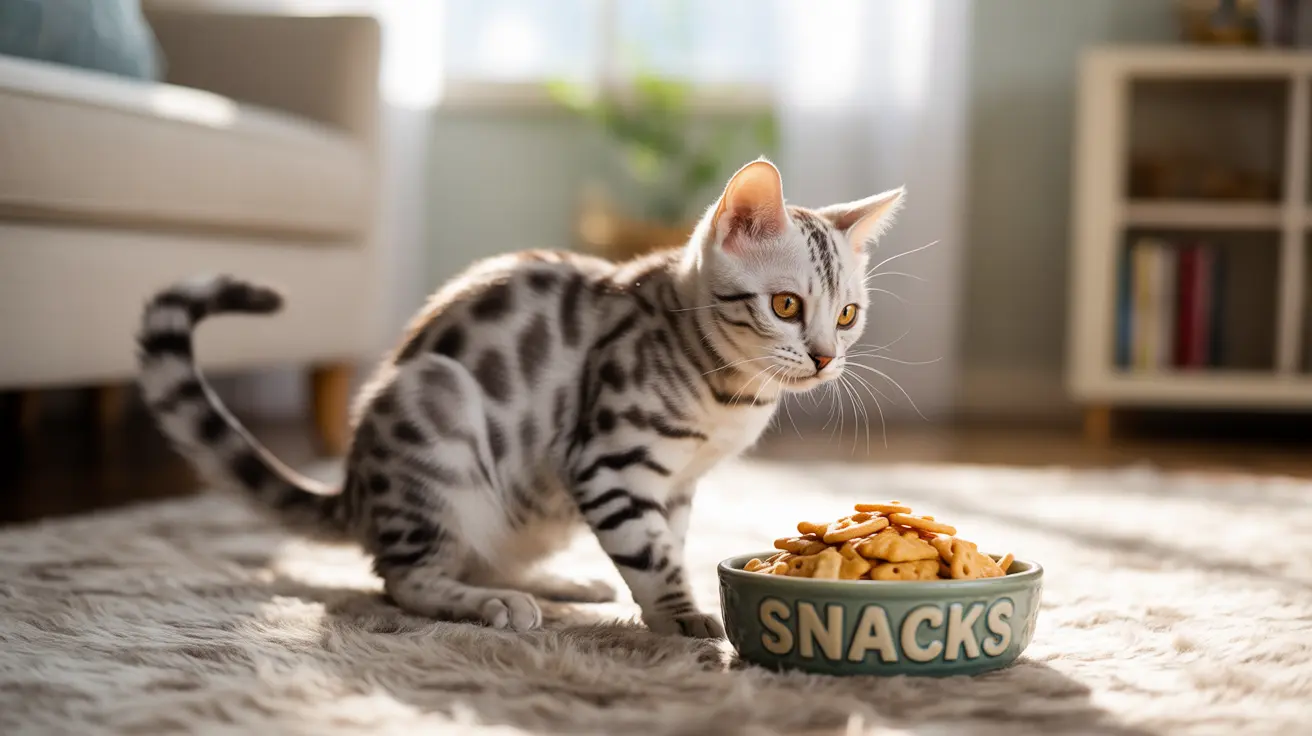As a pet parent, you might wonder if sharing your favorite snacks with your feline friend is safe. Goldfish crackers, those beloved cheesy treats, often catch our cats' attention - but should they be eating them? Let's explore the veterinary perspective on cats and Goldfish crackers, including potential risks, ingredients of concern, and safer alternatives for your pet.
Understanding the Risks of Goldfish Crackers for Cats
Cats are obligate carnivores, meaning their bodies are designed to process and utilize nutrients primarily from meat sources. Goldfish crackers, while tasty for humans, contain several ingredients that can be problematic or even dangerous for cats:
Potentially Harmful Ingredients
The primary ingredients in Goldfish crackers that raise concerns for cats include:
- Onion powder (toxic to cats)
- High sodium content
- Artificial additives and preservatives
- Dairy products
- Enriched wheat flour (unnecessary carbohydrates)
Health Concerns and Warning Signs
While a single Goldfish cracker might not cause immediate harm, regular consumption can lead to several health issues:
Short-term Effects
- Digestive upset
- Vomiting
- Diarrhea
- Excessive thirst
Long-term Risks
- Anemia (from onion powder exposure)
- Obesity
- Nutritional deficiencies
- Diabetes risk
Why Cats Shouldn't Eat Goldfish Crackers
The fundamental issue with feeding Goldfish crackers to cats goes beyond immediate safety concerns. These snacks:
- Provide no nutritional value for cats
- Contain unnecessary carbohydrates
- May trigger allergic reactions
- Could lead to unhealthy eating habits
Safe Alternatives to Goldfish Crackers
Instead of sharing Goldfish crackers with your cat, consider these veterinarian-approved treats:
- Commercial cat treats
- Small pieces of cooked chicken
- Tiny bits of plain, cooked fish
- Freeze-dried meat treats
What to Do If Your Cat Eats Goldfish Crackers
If your cat manages to sneak a Goldfish cracker, don't panic. Monitor them for these symptoms:
- Unusual lethargy
- Changes in appetite
- Digestive issues
- Excessive thirst or urination
Frequently Asked Questions
Can cats safely eat Goldfish crackers or are they toxic?
While not immediately toxic in very small amounts, Goldfish crackers contain ingredients like onion powder that can be harmful to cats and should be avoided.
What harmful ingredients in Goldfish crackers should cat owners watch out for?
The main concerning ingredients are onion powder, high sodium levels, artificial additives, and dairy products, which can all cause health issues in cats.
What symptoms indicate a cat may be ill after eating Goldfish crackers?
Watch for vomiting, diarrhea, excessive thirst, lethargy, or changes in appetite. If these symptoms occur, consult your veterinarian.
How do Goldfish crackers fail to meet a cat's nutritional needs?
As obligate carnivores, cats require meat-based protein and specific nutrients not found in Goldfish crackers. These crackers provide empty calories and potentially harmful ingredients.
What are safe treat alternatives to Goldfish crackers for cats?
Safe alternatives include commercial cat treats, small pieces of cooked chicken or fish, and specially formulated feline treats that meet their nutritional needs.
Conclusion
While Goldfish crackers might seem like a harmless treat, they're not appropriate for feline consumption. Focus on providing your cat with nutritionally appropriate treats and maintain a balanced, meat-based diet. When in doubt, always consult with your veterinarian about safe treat options for your feline friend.






